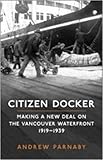Citizen Docker : Making a New Deal on the Vancouver Waterfront, 1919-1939 / Andrew Parnaby.
Material type: TextSeries: Canadian Social History SeriesPublisher: Toronto : University of Toronto Press, [2008]Copyright date: ©2008Description: 1 online resource (304 p.)Content type:
TextSeries: Canadian Social History SeriesPublisher: Toronto : University of Toronto Press, [2008]Copyright date: ©2008Description: 1 online resource (304 p.)Content type: - 9780802093844
- 9781442687646
- Citizenship -- Canada -- History -- 20th century
- Industrial relations -- British Columbia -- Vancouver -- History -- 20th century
- Labor movement -- British Columbia -- Vancouver -- History
- Stevedores -- British Columbia -- Vancouver -- History
- DISCOUNT-B
- HISTORY / Canada / Post-Confederation (1867-)
- 331.7/6138716409711
- HD8039.L82 C3 2007eb
- online - DeGruyter
| Item type | Current library | Call number | URL | Status | Notes | Barcode | |
|---|---|---|---|---|---|---|---|
 eBook
eBook
|
Biblioteca "Angelicum" Pont. Univ. S.Tommaso d'Aquino Nuvola online | online - DeGruyter (Browse shelf(Opens below)) | Online access | Not for loan (Accesso limitato) | Accesso per gli utenti autorizzati / Access for authorized users | (dgr)9781442687646 |
restricted access online access with authorization star
http://purl.org/coar/access_right/c_16ec
After the First World War, many Canadians were concerned with the possibility of national regeneration. Progressive-minded politicians, academics, church leaders, and social reformers turned increasingly to the state for solutions. Yet, as significant as the state was in articulating and instituting a new morality, outside actors such as employers were active in pursuing reform agendas as well, taking aim at the welfare of the family, citizen, and nation. Citizen Docker considers this trend, focusing on the Vancouver waterfront as a case in point.After the war, waterfront employers embarked on an ambitious program - welfare capitalism - to ease industrial relations, increase the efficiency of the port, and, ultimately, recondition longshoremen themselves. Andrew Parnaby considers these reforms as a microcosm of the process of accommodation between labour and capital that affected Canadian society as a whole in the 1920s and 1930s. By creating a new sense of entitlement among waterfront workers, one that could not be satisfied by employers during the Great Depression, welfare capitalism played an important role in the cultural transformation that took place after the Second World War.Encompassing labour and gender history, aboriginal studies, and the study of state formation, Citizen Docker examines the deep shift in the aspirations of working people, and the implications that shift had on Canadian society in the interwar years and beyond.
Mode of access: Internet via World Wide Web.
In English.
Description based on online resource; title from PDF title page (publisher's Web site, viewed 01. Nov 2023)


